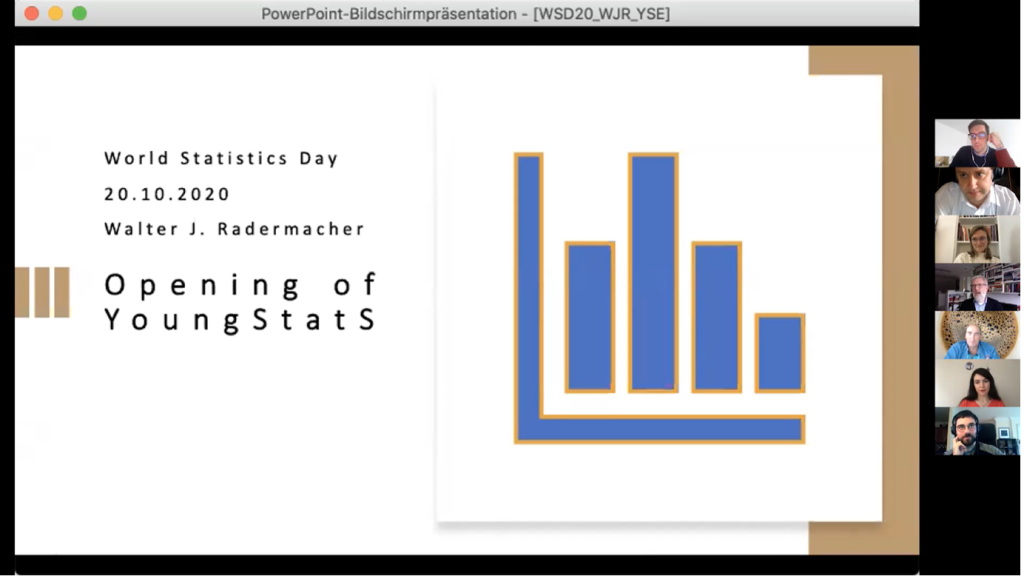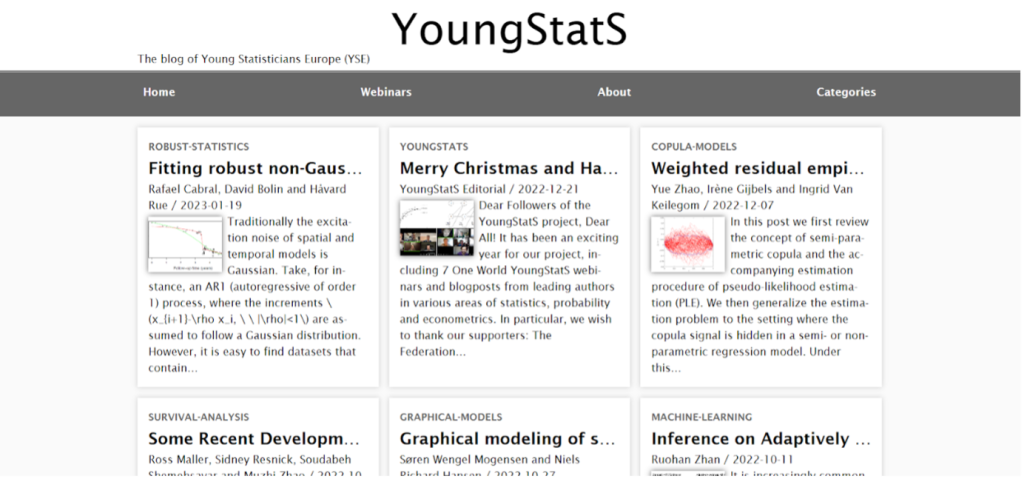Towards an open community in statistics, probability and econometrics: Introduction to interviews with YoungStatS project presenters.
Andrej Srakar, PhD, is coordinator and Co-Editor of the YoungStatS project. He works as a Scientific Associate at the Institute for Economic Research in Ljubljana, Slovenia, and is an Assistant Professor at the School of Economics and Business, University of Ljubljana. He writes:
I am pleased to introduce a forthcoming series of interviews in the IMS Bulletin with collaborators of the YoungStatS project. YoungStatS derives from changes in present day science, oriented toward an open science community that favors the communication of scientific findings, as well as the outburst of connections caused by online seminars such as One World Probability, One World ABC, Online Causal Inference Seminar and Gary Chamberlain seminar in econometrics. We discuss the developments in the statistical, probabilistic, and econometric communities during the pandemic and we present possibilities, vision, and plans of the project in the upcoming years.
Science, including probability and statistics, should not take place in an ivory tower. This is the message resulting from decades of discussions within the scientific community, exacerbated during the COVID-19 pandemic. In recent times I have observed econometricians such as Pedro Sant’Anna and Peter Hull constantly attempting to discuss their findings and bring them to the general public, often asking their followers for suggestions directly on social media. This highlights how communication is an important part of good science. That is why presenting findings in a seminar is as beneficial to the authors as it is to the participants. All the online seminars in times of the pandemic featured the same mantra: “We strongly encourage you to ask questions.”
It was this atmosphere that gave birth to YoungStatS. We settled on the idea, best exemplified by the VoxEU economics policy website, or the zbMATH Open project, of providing a platform where readers can access short summaries of recent leading research works in their fields. It was my own proposal to develop such a platform for statistics and probability, with possible extensions to data science, econometrics, and mathematics. The idea was adopted by the Young Statisticians Europe initiative of The Federation of European National Statistical Societies and presented to the public on World Statistics Day 2020.

Screenshot from the opening of the YoungStatS project in October 2020.
From the beginning we have been fortunate enough to be supported by the Bernoulli Society for Mathematical Statistics and Probability, as well as the Institute of Mathematical Statistics. We have also received supportive emails from the Econometric Society.
As well as the blog platform, YoungStatS features the renowned One World YoungStatS webinars. This initiative has been inspired by the One World Probability project, which united scholars in probability throughout the COVID-19 pandemic. Our (typically monthly) webinars present leading works of younger scholars in all areas of mathematical statistics, probability, econometrics, and data science (with extensions in mathematical physics and other areas of mathematics).
In March we are starting a joint webinar collection in collaboration with the New Researchers Group of the Institute of Mathematical Statistics and the Young Data Science Researcher Seminar Zurich. [See Pragya Sur’s article about the IMS New Researchers Group.]
While the pandemic has been a time of work overload for scholars, posts on our blog have encompassed important recent debates and findings. We have posted summaries with R code of the Bayesian causal forests estimator of P. Richard Hahn and coauthors and its sequel BCF-IV of Falco Bargagli-Stoffi. Our articles have included the explanations of generative adversarial networks (GAN) by Gérard Biau and coauthors and of higher-order targeted maximum likelihood estimator by Zeyi Wang and Mark van der Laan. Balázs Ráth, Jan M. Swart and coauthors have written about endogeny for frozen percolation on the binary tree. Recently, Ruohan Zhan has contributed a summary of her joint work on inference for adaptively collected data. Yue Zhao, Irène Gijbels and Ingrid Van Keilegom provided a summary of their Annals of Statistics article on parametric copula adjusted for non- and semiparametric regression.

The YoungStatS website featuring blog posts and links to webinars.
In future, it is our aim to develop into a platform enabling constant and easy presentations, while retaining the One World webinar vitality. We will continue in the direction of presenting different areas of mathematical statistics, probability, econometrics, data science, and mathematics. We live in the artificial intelligence era and we expect a large development of data science and all its methodologies. Probability remains foremost an interesting and possibility-rich area of present day mathematics. Econometrics opens to data science and machine learning and many novel developments are expected in the near future. Bayesian statistics, algebraic statistics, causal inference, object-based data analysis, nonparametric statistics are just few areas with strong vitality. In the blog platform, as well as the webinar series, we aim to represent, reflect, and steer these developments.
In the next issues of the IMS Bulletin, you will be able to read interviews with selected authors, presenters, and discussants of YoungStatS. We have already agreed to contribute with Susan Athey, Antti Knowles and Germain Van Bever. We plan to bring you the vitality of our project closer and contribute to the set objective, open community of scholarship in statistics and probability, as well as quality content. We hope you enjoy it.
Check it out at https://youngstats.github.io/